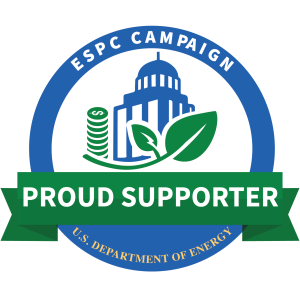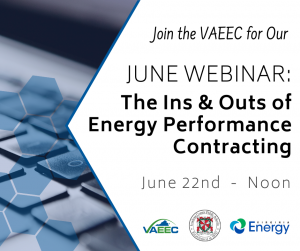Energy Performance Contracting
Governor Northam signed Executive Order 43 in 2019, establishing Virginia’s first policy goal of decarbonizing the electric sector by 2050. In 2020, the Virginia Clean Economy Act codified and built upon this goal. To achieve these ambitious clean energy goals, all state agencies and institutions are instructed to utilize energy performance contracting (EPC). In 2021, Virginia became the second state nationwide to reach $1B in total energy savings from an EPC program.
 The EPC process has remained fairly unchanged since 2001. However, in the summer of 2018, Virginia Energy (formerly known as the Virginia Department of Mines, Minerals and Energy, or DMME) released new guidelines for the Commonwealth. While much of the process remains the same, all pre-approved energy service companies (ESCOs) are now invited to the Back of the Envelope. This change is intended to create more competition among ESCOs and provide agencies and public bodies with more choices. A few of the key points include:
The EPC process has remained fairly unchanged since 2001. However, in the summer of 2018, Virginia Energy (formerly known as the Virginia Department of Mines, Minerals and Energy, or DMME) released new guidelines for the Commonwealth. While much of the process remains the same, all pre-approved energy service companies (ESCOs) are now invited to the Back of the Envelope. This change is intended to create more competition among ESCOs and provide agencies and public bodies with more choices. A few of the key points include:
- Statewide contract open to state agencies and public bodies
- 17 pre-qualified, vetted ESCOs
- Budget neutral
- No change orders
- Guaranteed and bonded savings
- ESCO enters measurement and verification data into the Department of Energy’s eProjectBuilding software; data is made available to the end-user
- Virginia Energy support is provided throughout the entire process
Additionally, the VAEEC worked with Virginia Energy and our ESCO members to update the existing legislation during the 2022 General Assembly session. Energy Performance Contracts are now able to finance all roof repairs and full replacements, allowing public buildings to use EPC to become solar-ready.
The VAEEC’s recommendation for performance contracting is to expand the state’s energy efficiency program for state and higher education facilities. Much like federal legislation requiring justification for inaction on performance contracting, state agencies and departments could be required to provide to the Governor’s office their rationale for not implementing energy performance contracts that guarantee savings and could lower the tax burden on the Commonwealth’s citizens. Even though Virginia has made significant progress with performance contracting in recent years, it remains a largely untapped source of cost savings.
 According to Trane, a leading energy performance contracting company in Virginia, they have been able to save their public-sector clients 20-40% on their energy bills through Energy Performance Contracts. These expenses are recovered through energy upgrades, at no additional cost to taxpayers, through work that pays for itself. Over the next 10-15 years, Trane estimates that there is more than $1B in untapped self-paying energy efficiency projects in public buildings still left to do in Virginia.
According to Trane, a leading energy performance contracting company in Virginia, they have been able to save their public-sector clients 20-40% on their energy bills through Energy Performance Contracts. These expenses are recovered through energy upgrades, at no additional cost to taxpayers, through work that pays for itself. Over the next 10-15 years, Trane estimates that there is more than $1B in untapped self-paying energy efficiency projects in public buildings still left to do in Virginia.
Over $3 billion in deferred maintenance has built up across state agencies and higher education institutions over the last several years due to the recession. These budget constraints have caused increased competition for capital dollars, wherein deferred maintenance is usually the last to be addressed. Typically, at least half of all deferred maintenance is energy-related and could be reduced through performance contracting. Performance contracting can help divert needed capital dollars away from buying replacement chillers, lighting, etc, and instead funnel those dollars to mission-critical activities — all while upgrading the performance, functionality, and comfort of the facilities. Operating budgets will also be reduced through both lower energy costs as well as reduced maintenance costs.
 Performance contracting can help address the most urgent needs and significantly reduce deferred maintenance in the Commonwealth.
Performance contracting can help address the most urgent needs and significantly reduce deferred maintenance in the Commonwealth.
In 2024, the VAEEC partnered with the U.S. Department of Energy on their Energy Savings Performance Contracting (ESPC) Campaign. The ESPC Campaign engages public sector building owners across the municipal and state governments, universities and colleges, schools, and hospitals (MUSH) market through participant and supporter partnership pathways to support, expand, and enhance the use of ESPC and to cultivate an experienced network of ESPC practitioners. The campaign aims for participants to collectively achieve $1 billion in measured and verified savings by 2030 to achieve significant energy, environmental, and cost savings benefits.
Energy Performance Contracting 101
Energy Performance Contracting (EPC) is available to all state agencies and public bodies in the Commonwealth. It is a budget-neutral approach to implement energy-saving improvements without using funds from capital budgets. Work is done through an energy service company, and guaranteed cost savings from the project cover the price of the equipment installed. More information can be found on Virginia Energy’s fact sheet.
Resources
2022 VAEEC Fact Sheet: EPC Roof Exemption Legislation
2022 VAEEC Webinar: The Ins and Outs of Energy Performance Contracting
2018 Virginia Energy Plan Update
2018 Updated Request for Proposal for the Back of the Envelope
DOE’s Energy Savings Performance Contracting (ESPC) Campaign Presentation
DOE’s Energy Savings Performance Contracting (ESPC) Process Fact Sheet
DOE’s ESPC Opportunities & Advantages
Virginia Energy’s Energy Savings Performance Contracting Webpage
View our EPC recommendations in our report: Why Energy Efficiency is a Smart Investment for Virginia
VAEEC Blog Posts & Updates
News Articles
1
Apr 19



